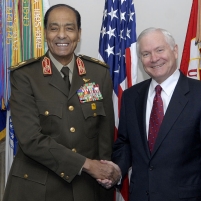In Egypt, Arab Spring Replaced by Military Dictatorship
Tuesday, June 19, 2012
 Egyptian dictator Hussein Tantawi with former Sec. of Defense Robert Gates (photo: Department of Defense)
Egyptian dictator Hussein Tantawi with former Sec. of Defense Robert Gates (photo: Department of Defense)
While competing candidates each declared victory following the presidential election, Egypt’s military made clear just who is in charge of the country, which has been trying to transition towards democracy.
Hours after the polls closed, marking the first presidential balloting since the fall of dictator Hosni Mubarak, the ruling military council, led by Hussein Tantawi, issued a temporary constitution that granted the generals broad powers and reduced the president to little more than a figurehead.
The announcement came after Egyptian media sources declared Mohamed Morsi, the Muslim Brotherhood candidate, the winner of the election. Former Prime Minister Ahmed Shafiq also claimed victory.
But it was the apparent success of Morsi that likely prompted the military to assert its dominance, for fear of the Muslim Brotherhood taking control of the government.
Four months ago, the military dissolved Parliament after the Muslim Brotherhood won control of the legislative body.
Under the new constitution, the generals have control of all laws and the national budget, as well as immunity from any oversight.
“The new constitutional declaration completed Egypt’s official transformation into a military dictatorship,” Hossam Bahgat, director of the Egyptian Initiative for Personal Rights, wrote in an online commentary.
Nathan Brown, an Egypt expert at George Washington University, told The New York Times that the military’s move amounted to a coup “in many obvious ways.
He added: “It brings back martial law and protects the military from any public, presidential or parliamentary scrutiny. And it perpetuates the generals’ dominance of the political system.”
In the wake of international condemnation, the leaders of the Egyptian military softened the tone of their statements, but there was no indication that they intended to change their actions.
-Noel Brinkerhoff
To Learn More:
Egypt’s Military Cements Its Powers as Voting Ends (by David Kirkpatrick, New York Times)
Egypt’s Presidential Candidates Declare Victory, But Military Generals Assert Vast Power (by Ernesto Londoño and Leila Fadel, Washington Post)
- Top Stories
- Unusual News
- Where is the Money Going?
- Controversies
- U.S. and the World
- Appointments and Resignations
- Latest News
- Trump to Stop Deportations If…
- Trump Denounces World Series
- What If China Invaded the United States?
- Donald Trump Has a Mental Health Problem and It Has a Name
- Trump Goes on Renaming Frenzy






Comments